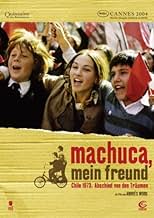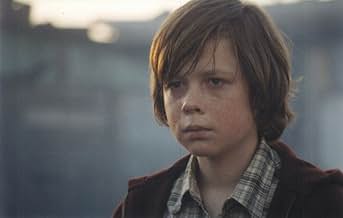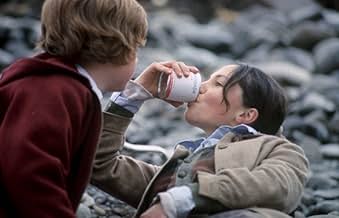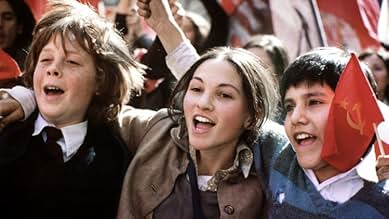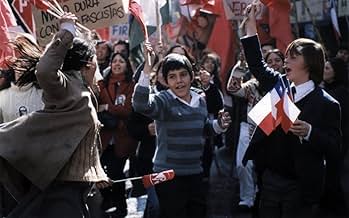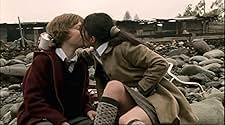VALUTAZIONE IMDb
7,7/10
12.976
LA TUA VALUTAZIONE
Nel 1973, due dodicenni cileni di diversa estrazione sociale stringono amicizia. Ognuno scopre il mondo dell'altro, man mano che le tensioni politiche nel loro paese aumentano.Nel 1973, due dodicenni cileni di diversa estrazione sociale stringono amicizia. Ognuno scopre il mondo dell'altro, man mano che le tensioni politiche nel loro paese aumentano.Nel 1973, due dodicenni cileni di diversa estrazione sociale stringono amicizia. Ognuno scopre il mondo dell'altro, man mano che le tensioni politiche nel loro paese aumentano.
- Regia
- Sceneggiatura
- Star
- Premi
- 13 vittorie e 8 candidature totali
Aline Küppenheim
- María Luisa Infante
- (as Aline Kuppenheim)
Daniel Alcaíno
- Sargento Ejército
- (as Daniel Alcaino)
Recensioni in evidenza
In 1973, in Santiago of Chile of the first socialist president democratically elected in a Latin-American country, President Salvador Allende, the principal of the Saint Patrick School, Father McEnroe (Ernesto Malbran) makes a trial of integration between students of the upper and lower classes. The bourgeois boy Gonzalo Infante (Matías Quer) and the boy from the slum Pedro Machuca (Ariel Mateluna) become great friends, while the conflicts on the streets leads Chile to the bloody and repressive military coup of General Augusto Pinochet on 11 September 1973, changing definitely their lives, their relationship and their country.
"Machuca" is a touching and realistic tale of friendship and coming to age in times of military coup in Chile. The Chilean director Andrés Wood made this fantastic movie following the political genre of Costa Gravas, but with a subtle drama with two children getting conscience of the fight of classes and the changes in their country by force and violence. The story in some moments seems to be a documentary so perfect the direction and acting are. The debut of the two lead actors, Matías Quer and Ariel Mateluna, is awesome: the eyes of the silent Matías Quer disclosing reality and the facial expression of Ariel Mateluna are amazing. "Machuca" is a highly recommended movie, and for the younger generations slightly see what happened in the 70's in South America and particularly in Chile. A few figures about Pinochet's dictatorship: 30,000 Chileans were killed; 100,000 Chileans were arrested without a trial; 22,000 students were expelled from the universities; 150,000 Chileans were exiled. My vote is ten.
Title (Brazil): "Machuca"
"Machuca" is a touching and realistic tale of friendship and coming to age in times of military coup in Chile. The Chilean director Andrés Wood made this fantastic movie following the political genre of Costa Gravas, but with a subtle drama with two children getting conscience of the fight of classes and the changes in their country by force and violence. The story in some moments seems to be a documentary so perfect the direction and acting are. The debut of the two lead actors, Matías Quer and Ariel Mateluna, is awesome: the eyes of the silent Matías Quer disclosing reality and the facial expression of Ariel Mateluna are amazing. "Machuca" is a highly recommended movie, and for the younger generations slightly see what happened in the 70's in South America and particularly in Chile. A few figures about Pinochet's dictatorship: 30,000 Chileans were killed; 100,000 Chileans were arrested without a trial; 22,000 students were expelled from the universities; 150,000 Chileans were exiled. My vote is ten.
Title (Brazil): "Machuca"
Although i was not old enough to live through these events, its repercussions are still felt today. Its interesting to see this movie in the theater and hear older people in the audience booing and cheering at the different scenes and historical characters in the movie, meaning that it accurately depicts the events. The movie is excellent in the way it portrays the everyday life experienced back in those days. The movie is apolitical in the way the main characters are children, so the focus is everyday life more than taking an actual view. The great special effects used, increase the realism and makes the movie so much better, and you don't even notice they are being used.
I recommend this movie 100% both to Chileans, and foreigners that want a glimpse on the life of the upper/middle classes in Chile back in 1973.
I recommend this movie 100% both to Chileans, and foreigners that want a glimpse on the life of the upper/middle classes in Chile back in 1973.
This is an absolutely wonderful film that captures a very interesting period of history told as a coming-of-age tale from the perspective of three pubescent school children. Like "Diaros de Motocicleta", the recent film about a young Ernesto Guevara, this is NOT simply a political diatribe. It does not romanticize the Allende government or the difficulties (riots, shortages, etc.)that the country went through during his turbulent reign. It certainly doesn't paint the Pinochet coup in a very favorable light, but I don't see how you can make the overthrow of a democratically-elected government and the murder, torture, and disappearance of some 3,000 people look like a wonderful thing. The film portrays many Pinochet supporters either as rich and corrupt or as small-minded, reactionary bullies (which is not entirely inaccurate), but it certainly doesn't shy away from the dark side of the Allende revolution( Allende supporters are shown accosting middle-class Chileans in the street, Allende himself appears in actual TV footage of his notorious meeting with Soviet leader Leonid Breshnev). Really though it would be a shame if continuing political differences stop people from seeing this superb film which really transcends politics to capture the spirit of youth and a time that, as terrible as it was, will never be forgotten.
10aharmas
This film reaches back and looks at history in a very intimate and personal way. Its young protagonist is shown, growing up, not quite understanding what is happening around him. His own life is the middle of a crisis, and suddenly he is in the middle of his own country's political storm. Gonzalo is one of the lucky ones, a young man who escaped the horrors while he learned how to become a better human being.
Andres Wood's direction is assured and gentle. He shows his love of his country, its main characters, his own history (there are strong hints at this being at least auto-biographical). His film is beautifully scored and photographed; in addition to having one of the best performances ever by a group of children. The movie moves along quietly, touching us, teaching us, and taking us along in an unforgettable study of humanity at its worst and its best.
Andres Wood's direction is assured and gentle. He shows his love of his country, its main characters, his own history (there are strong hints at this being at least auto-biographical). His film is beautifully scored and photographed; in addition to having one of the best performances ever by a group of children. The movie moves along quietly, touching us, teaching us, and taking us along in an unforgettable study of humanity at its worst and its best.
10dsalvat1
This movie tells a tale on the eve of the darkest hour in Chileann history, where two boys of different social background become friends.
This is a very powerful film, especially for Chileanns and many Latin Americans that suffer the prejudice of classicism (the racism of Latin America) and their ideals being beaten away from them.
You will notice many resentments and insults on this message board as the film gets more exposure due to the fact that some people still live in the past.
I hope this film brings everybody together and shows that no matter what race, religion, sexual orientation or social class, children do not discriminate, everybody feels the same emotions.
Hate is learned by the actions of role models.
This is a very powerful film, especially for Chileanns and many Latin Americans that suffer the prejudice of classicism (the racism of Latin America) and their ideals being beaten away from them.
You will notice many resentments and insults on this message board as the film gets more exposure due to the fact that some people still live in the past.
I hope this film brings everybody together and shows that no matter what race, religion, sexual orientation or social class, children do not discriminate, everybody feels the same emotions.
Hate is learned by the actions of role models.
Lo sapevi?
- QuizAs stated by the director in several interviews, the movie was shot only on Sundays, due to its small budget.
- BlooperSilvana is standing by the outhouse, then moments later, after camera pans, appears on the other side of Gonzalo.
- Citazioni
Patricio Infante: Socialism might be better for Chile but not for us.
- Curiosità sui creditiIn the credits at the beginning of the film, the last letter of each word drifts slowly to the right separating from the names
- ConnessioniFeatured in Sin maquillaje: Tamara Acosta (2013)
- Colonne sonoreAi Amor
Written and performed by Buddy Richard
I più visti
Accedi per valutare e creare un elenco di titoli salvati per ottenere consigli personalizzati
- How long is Machuca?Powered by Alexa
Dettagli
- Data di uscita
- Paesi di origine
- Sito ufficiale
- Lingue
- Celebre anche come
- Мачука
- Luoghi delle riprese
- Aziende produttrici
- Vedi altri crediti dell’azienda su IMDbPro
Botteghino
- Budget
- 1.500.000 USD (previsto)
- Lordo Stati Uniti e Canada
- 26.676 USD
- Fine settimana di apertura Stati Uniti e Canada
- 4635 USD
- 23 gen 2005
- Lordo in tutto il mondo
- 3.187.700 USD
- Tempo di esecuzione1 ora 56 minuti
- Colore
- Mix di suoni
- Proporzioni
- 1.85 : 1
Contribuisci a questa pagina
Suggerisci una modifica o aggiungi i contenuti mancanti



